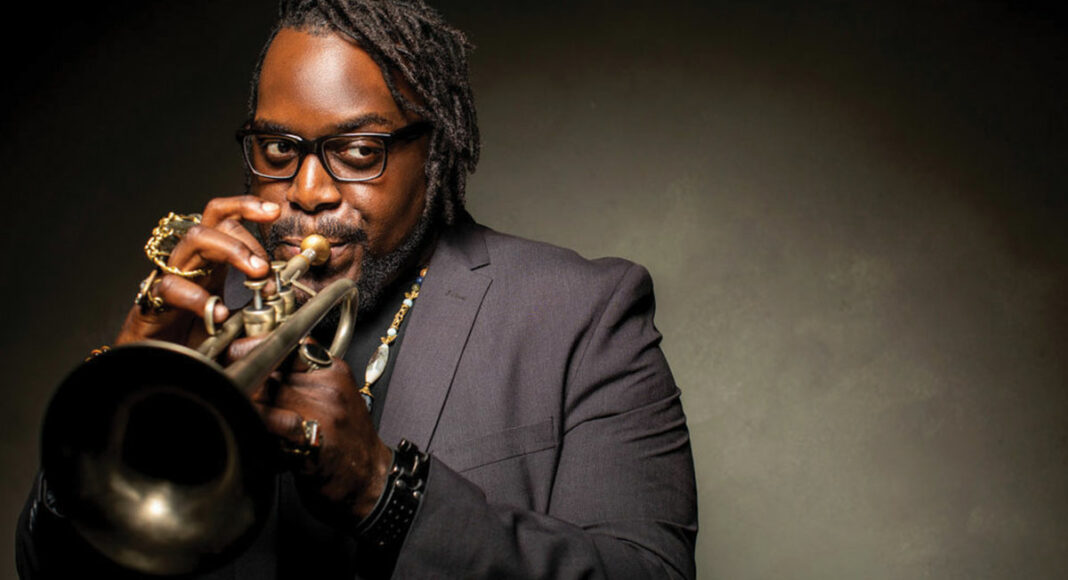Marquis Hill has a theory about time.
“I look at it as I’m a part of this continuum,” says the 32-year-old trumpeter. “If you listen to someone like Kendrick Lamar—the rhythms that he’s spitting when he raps—and you listen to someone like Charlie Parker, or Dizzy Gillespie—the types of bebop, tap-dance rhythms that they’re playing—it’s the same thing. The flow is exactly the same.”
Hill first rose to international acclaim in 2014, when he won the prestigious Thelonious Monk International Jazz Competition. The following year, he was profiled by PBS on an episode of Jazz Night in America.
Last November, Hill released Modern Flows Vol. II, a bold, exciting album which develops his theory on music and time. Though it’s very much a jazz record musically, it is as in touch with contemporary musicians like Lamar and Flying Lotus as it is with Miles Davis, Roy Hargrove or Donald Byrd. Often, it puts them all in the same conversation at once.
In a rare move, the album opens with a kind of mission statement. Before a single note is played, the listener hears a voice: “My flow is rooted. My flow is modern. Modern Flows Vol. II.”
The speaker is Chicago rapper Brandon Alexander Williams, who reappears periodically throughout the album. Over a hypnotic vibraphone line, Williams develops the album’s themes: black history, art, time, and consciousness. On the next track, the vibraphone line morphs slightly, a shift in its own musical continuum, as it leads the charge for the excellent “Twin Flame.” Sprightly and packed with melodies, it’s almost easy to forget that you’re listening to jazz music until the two-minute mark, when the song opens up for Hill and saxophonist Josh Johnson to trade improvisational passages. The two go back and forth, trading bars like battle rappers before meeting back up again on the melody.
“Twin Flame” leads to the metamorphic “Ego vs. Spirit,” a track which features J Dilla style beats, a Miles Davis-like melody, and a choir straight out of Kamasi Washington—and that’s all before the spoken word passage kicks in. Somehow, it all hangs together, each element sounding less like separate pieces stitched together, and more like points of reference along a line.
“It keeps bringing me back to that word ‘continuum,’” Hill says. “We’re all connected.”
Raised in a music-loving household on the south side of Chicago, Hill picked up the trumpet at age 10, playing in his elementary school’s jazz band. There, he was forever changed when he heard the music of Lee Morgan.
“It was mind-blowing,” he says. “I had never heard that form of black music before. I had heard the horn solos on Marvin Gaye records, and on Al Green records, but never heard actual Lee Morgan, Dizzy Gillespie—actual jazz, from the diaspora of bebop. I believe that I fell in love with the music at that moment. I’m grateful that I was exposed to it at a young age.”
An early point on his own continuum, Hill still credits that Lee Morgan record with shaping his sound today.
“Specifically the tone on track two, ‘Since I Fell For You,’” he says. “I’ll never forget, I heard that track and just fell in love. He had a very warm, dark, fluffy sound on that record, and it just stuck with me.”
While he keeps his early influences present today, Hill always keeps his eye on the far end of the continuum: the future, and the musical possibilities it brings.
“Everything is very open musically now,” he says. “I think it’s beautiful. It creates newness. It creates new ideas. It creates new sounds. It creates new concepts and directions. It’s a beautiful thing, and I’m just happy to be a part of it.”














